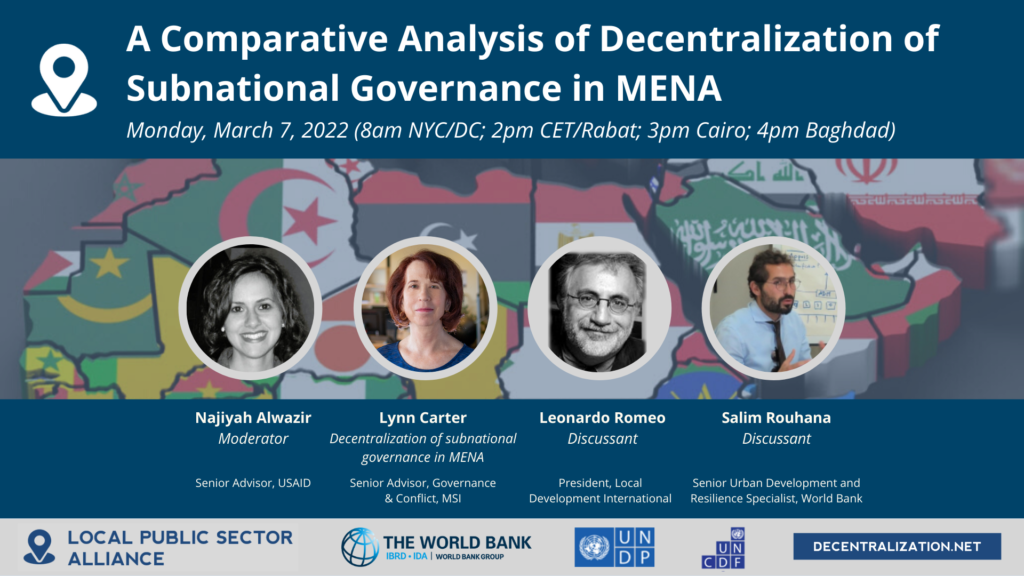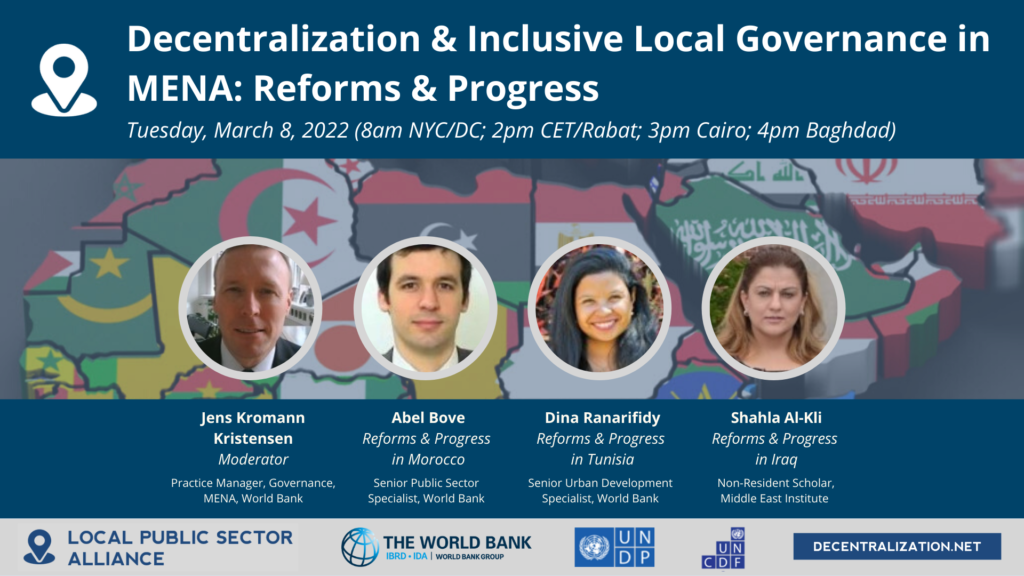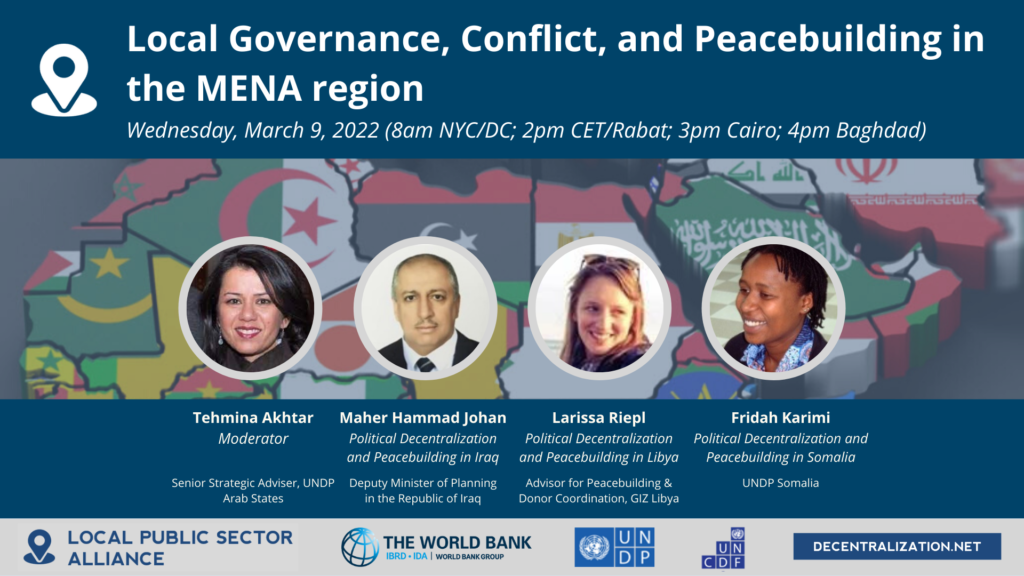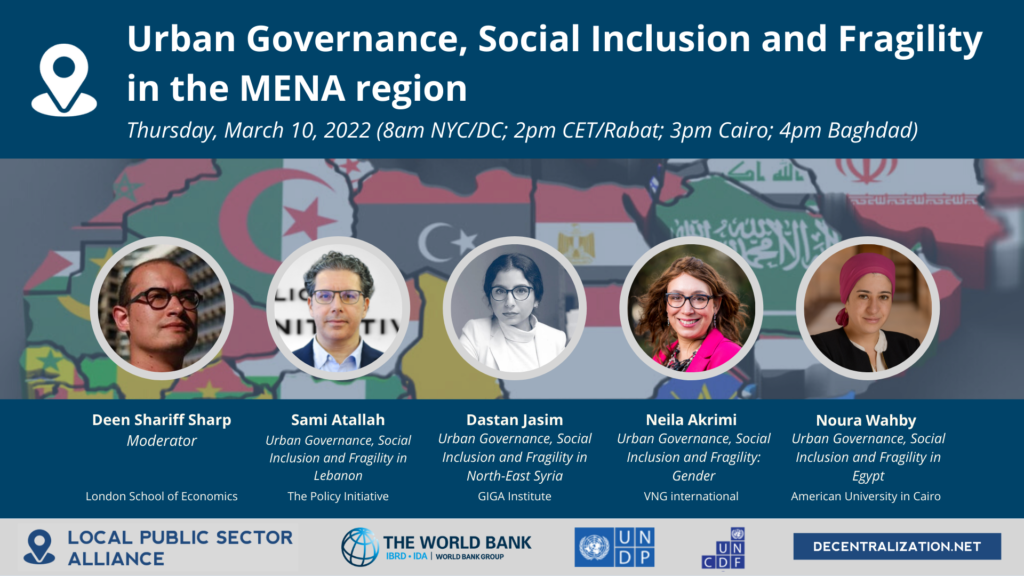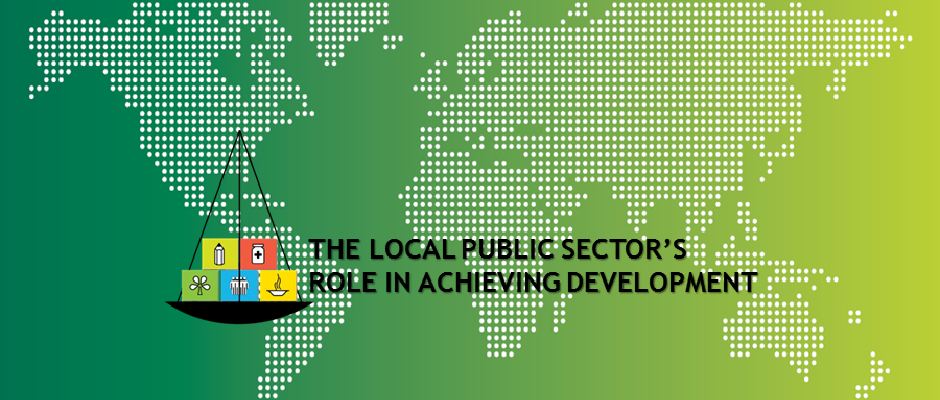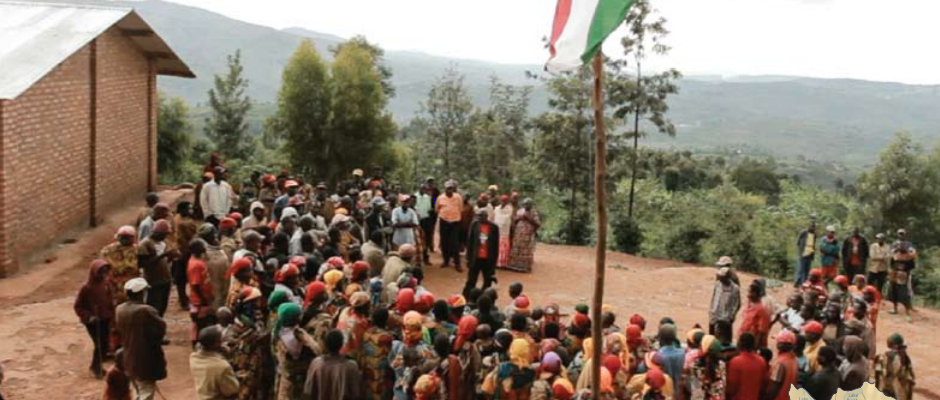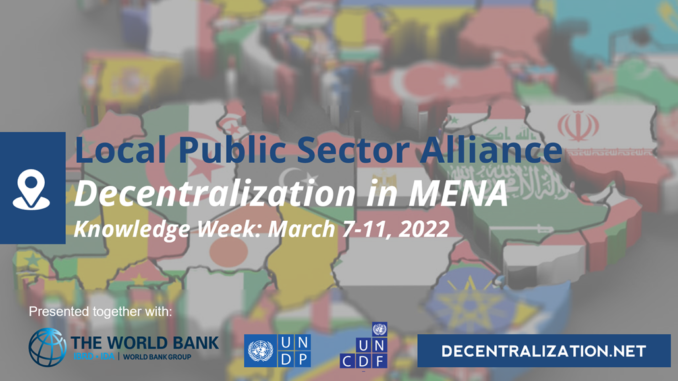
As part of the global webinar series on decentralization and local development around the world, the Local Public Sector Alliance (LPSA) hosted the ”Decentralization and Local Development in the Middle East & North Africa (MENA) – Knowledge Sharing Week” in early March 2022. The webinars were co-organized with the World Bank’s Subnational Governance and Decentralization Global Solutions Group, UNDP, UNCDF, and several global partners. Together with UNDP, DeLoG co-hosted the sessions “Local Governance, Conflict, and Peacebuilding” and “Urban Governance, Social Inclusion and Fragility”.
Background. Effective decentralization and localization form an important precondition for resilient, inclusive, sustainable, equitable and efficient development. Have decentralization processes taken place in the countries in the MENA region since the Arab Spring in 2011? Did they increase accountability of local and regional governments? This webinar series discussed trends regarding decentralization and local development in the MENA region, and included insights into:
- Regional overview(s) of decentralization and localization reform trends in Middle East & North Africa, offered by World Bank, UNDP, and other regional experts.
- Presentations and discussions of decentralization country reform experiences from the MENA region.
- Researcher/practitioner exchanges on policy-relevant research on decentralization and local development in Middle East & North Africa.
This webinar series introduced the audience to different contexts of decentralization efforts in the MENA region, by bringing together the expertise of practitioners and scholars working in the field. The series started with a comparative analysis of decentralization and subnational governance in MENA. The second day of the webinar series highlighted reforms and progress in the MENA region related to decentralization efforts. In the second half of the series, the webinars on “Local Governance, Conflict, and Peacebuilding” and “Urban Governance, Social Inclusion and Fragility” were co-hosted by DeLoG and UNDP. In the four sessions, the countries in focus were Egypt, Iraq, Jordan, Lebanon, Libya, Morocco, Somalia, Syria, Tunisia, and Yemen.
Below you can find a detailed account of the sessions and the links to the recordings:
A comparative analysis of decentralization and subnational governance in MENA
Speakers:
Najiyah Alwazir, USAID: Moderator
Lynn Carter, MSI: A comparative analysis of decentralization and subnational governance in MENA
Salim Rouhana, World Bank: Discussant remarks
Leonardo Romeo, Local Development International: Discussant remarks
The webinar, moderated by Najiyah Alwazir, addressed challenges and progress linked to a new spike of interest in decentralization in the MENA region after the Arab Spring in 2011. Lynn Carter highlighted key steps of the decentralization progress and relevant legal frameworks while referring to a USAID paper on Subnational Governance (2020). Leonardo Romeo and Salim Rouhana added valuable remarks as discussants.
Decentralization and inclusive local governance in MENA: reforms and progress
Speakers:
Jens Kristensen, World Bank: Moderator
Abel Bove, World Bank: Reforms and progress in Morocco
Dina Ranarifidy, World Bank: Reforms and progress in Tunisia
Shahla Al-Kli, Middle East Institute: Reforms and progress in Iraq
The second webinar highlighted reforms and progress related to decentralization and inclusive local governance in MENA. Jens Kristensen presented the key questions of the webinar and introduced the speakers of the session. Abel Bove provided an initial overview of decentralization reforms in Morocco and pointed out ways to improve fiscal decentralization and local government’s autonomy. The following country example of Tunisia was presented by Dina Ranarifidy, who identified key challenges to fully operationalizing a decentralized framework and highlighted necessary steps to move forward, for instance through leveraging decentralization to address regional disparities. Shahla Al-Kli presented the final country example of Iraq where popular discontent and demographic factors of an increasingly politically mature population have been identified as important entry points for more decentralization.
Local Governance, Conflict, and Peacebuilding in the MENA region
Speakers:
Tehmina Akhtar, Senior Strategic Adviser, UNDP Arab States: Moderator
Maher Hammad Johan, Deputy Minister of Planning, Republic of Iraq: Political Decentralization and Peacebuilding in Iraq
Larissa Riepl, GIZ Libya: Political Decentralization and Peacebuilding in Libya
Fridah Karimi, UNDP Somalia: Political Decentralization and Peacebuilding in Somalia
In the third webinar, Tehmina Akhtar, Senior Strategic Advisor at UNDP in the Arab States, moderated the panel discussion on political decentralization and peacebuilding in Iraq, Libya and Somalia. Deputy Minister of Planning of the Republic of Iraq, Maher Hammad Johan, presented challenges for decentralization, such as a lack of coordination of administrative and financial powers and the implementation of federal laws at the local level. In his experience, supporting local governments for effective service delivery has proven the best way to mitigating conflicts and security issues. Fridah Karimi, manager of UNDP Joint Program on Local Governance in Somalia, noted that the contestation of the provisional constitution in Somalia has led to a state of suspension between several Somali states and the national government. A lack of security, accessibility and data, as well as political interference remain the main challenges for decentralization processes in Somalia. Larissa Riepl, advisor for peacebuilding and donor coordination at GIZ Libya portfolio, introduced Libyan governance structures and noted that the demand for more decentralization following the Arab Spring aims to bring governance closer to the constituents. Larissa also noted that stronger local governance mechanisms might produce valuable local insights to be included in the overall peace process in Libya.
Urban Governance, Social Inclusion and Fragility in the MENA region
Speakers:
Deen Shariff Sharp, LSE: Moderator
Sami Atallah, The Policy Initiative: Urban Governance, Social Inclusion and Fragility in Lebanon
Dastan Jasim, GIGA Institute: Urban Governance, Social Inclusion and Fragility in North-East Syria
Neila Akrimi, VNG international: Urban Governance, Social Inclusion and Fragility: Gender
Noura Wahby, American University in Cairo: Urban Governance, Social Inclusion and Fragility in Egypt
The final webinar of the series set focus on urban governance, social inclusion and fragility in MENA. Deen Shariff Sharp, fellow at London School of Economics (LSE), moderated the virtual round table discussion. The first country example of Lebanon was presented by Sami Atallah, who noted that the misuse of taxation, accompanied by a lack in reliable demographic data, raises doubts concerning local officials’ accountability and their incentives for service delivery. Dastan Jasim, fellow at the German Institute for Global and Area studies (GIGA), addressed the case of North-East Syria where decentralized governance structures developed in the context of the Arab Spring. Dastan highlighted that when Syrian Armed Forces withdrew, mostly Kurdish forces started self-governing and self-administering the area, and the institutionalization of these structures is still an ongoing and highly costly process – this reflects the challenge of bottom-up approaches in state-building dynamics. Neila Akrimi, director general of the Centre for Innovative Local Governance (CILG-VNGi), identified different gender-related aspects of decentralization and social inclusion in the MENA region. Most notably, she addressed how decentralization policies can be used to allow women and youth at the local level to be heard. Noura Wahby, assistant professor at the at the American University in Cairo (AUC), discussed urban governance and social inclusion in Egypt with a particular focus on informal structures in cities like Cairo. Noura noted that research has shown that state governments’ such as in Egypt do not always have a monopoly on service distribution. In fact, communities are developing and maintaining everyday solutions to better urban governance and deal with environmental issues such as water scarcity – mechanisms that might become even more important in the future.
This overview of the MENA Knowledge Week was prepared by DeLoG; the original post can be found here.

